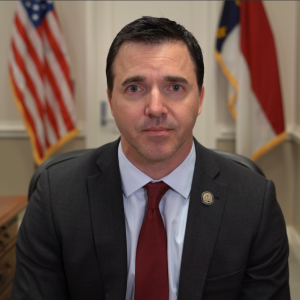FOR IMMEDIATE RELEASE
Tuesday, October 28, 2025
Email: nahmed@ncdoj.gov
Phone: 919-538-2809
RALEIGH – Attorney General Jeff Jackson is suing the U.S. Department of Agriculture (USDA) and the Office of Management and Budget for refusing to fund the Supplemental Nutrition Assistance Program (SNAP) during the government shutdown and withholding food assistance for 1.4 million North Carolinians, including nearly 600,000 children, more than 40,000 of whom are under 18 months old. This would be the first time ever that SNAP benefits have been delayed, even though USDA has at least $6 billion in contingency funds from Congress to use in emergencies like this one.
“Nearly 600,000 children in our state could be without food in a few days because USDA is playing an illegal game of shutdown politics,” said Attorney General Jeff Jackson. “They have emergency money to help feed children during this shutdown, and they’re refusing to spend it. I warned them last week that I would take them to court if they tried to hurt our kids, and today that’s what we’re doing.”
On the eve of the shutdown on Sept. 30, USDA assured states that contingency funds could be used to continue funding the SNAP program. But on Oct. 24, USDA reversed course and sent a memo to the states ordering them to suspend all November SNAP payments and any later payments. USDA claims that this is because of the government shutdown. Yet, since the shutdown began, the same agency has used its authority to give out billions for other programs and move around funds to help fund nutritional benefits for infants and pregnant women. SNAP monthly payments are about $175 per North Carolinian to help cover the most basic food and nutrition needs.
This delay in benefits is going to be devastating for North Carolina families and kids. Families who are already facing economic pressures because of the shutdown have been relying on food banks for support. Food banks are already straining to meet the demand after USDA cut $500 million nationwide in food deliveries in March.
Attorney General Jackson warned USDA last week that withholding these funds would risk further legal action. His lawsuit today alleges that the agency is violating the Administrative Procedure Act and the SNAP Act. He’s asking the court to require USDA to pay out SNAP benefits and cancel the USDA’s previous unlawful orders to the states. Attorney General Jackson is also filing a temporary restraining order later today asking the court to immediately turn benefits back on.
“The federal government is denying access to food for more than 1.4 million North Carolinians, including children, veterans, and people with disabilities,” said Governor Josh Stein. “The USDA must take immediate action to keep families from going hungry as it is required to do by law, and I thank Attorney General Jackson for standing up to secure these critical resources.”
“Food is foundational to our health and well-being – more than 1.4 million people in North Carolina depend on this critical program to avoid hunger and help put food on the table,” said NC Health and Human Services Secretary Dev Sangvai. “We hope for a quick resolution so people in North Carolina, especially children, don’t go hungry. NCDHHS is ready to issue benefits as soon as federal funding is provided.”
If North Carolinians need food assistance during this uncertain time, you may consider reaching out to the following resources:
- Find a food pantry near you through Feeding America.
- Call 2-1-1. This United Way service can help you find food assistance in your area.
- Contact your county’s department of social services to see if they have additional food assistance programs.
- View food access maps from NCDHHS here.
- Use the Food Bank of Central and Eastern North Carolina’s food finder tool.
North Carolinians may also consider donating to local food pantries and community organizations to help out their neighbors during this time.
Attorney General Jackson is filing this lawsuit alongside the attorneys general of Arizona, California, Colorado, Connecticut, Delaware, the District of Columbia, Hawaii, Illinois, Maine, Maryland, Massachusetts, Michigan, Minnesota, Nevada, New Jersey, New Mexico, New York, Oregon, Rhode Island, Vermont, Washington, and Wisconsin. The Governors of Kansas, Kentucky, and Pennsylvania have also joined.
A copy of the complaint is available here.
A copy of the temporary restraining order is available here.
A copy of NCDHHS’ declaration is available here.
###
Video (Available for media use)
Download the full video clip here.
Download segments from Attorney General Jackson’s video below:
Clip 1: “No matter what your politics, we cannot allow 600,000 kids in our state to go hungry. That’s wrong, and unlawful. And I’m going to fight for them with everything I’ve got.”
Clip 2: “That’s why, when you look at all the government shutdowns we’ve ever had as a country, you’ve never seen an interruption in SNAP payments. Because an emergency fund exists. This is the department choosing not to use the emergency money that Congress gave them. That’s why I’m taking them to court.”
Clip 3: “Recently, we got a letter from the Department of Agriculture telling us that as of November 1st, they would no longer be funding the program. They say that it’s because of the government shutdown and a lack of funds. This is not the case. The truth is, they have the money. There is a $6 billion emergency fund that Congress gave the department to make sure this didn’t happen.”
Graphics (Available for Media Use)


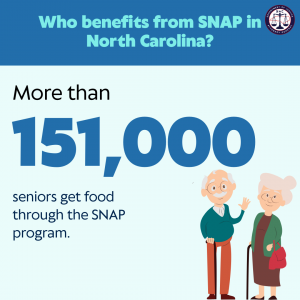
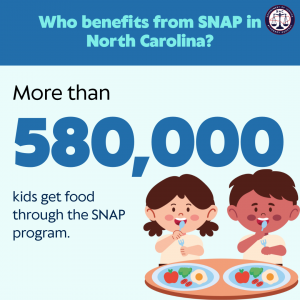
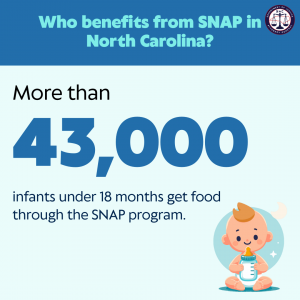
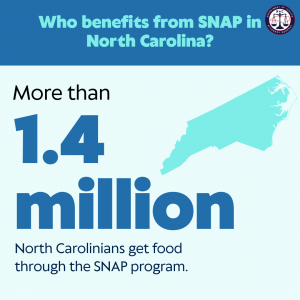
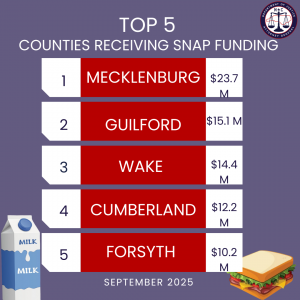
Quotes (Available for media use)
“When federal uncertainty ripples through our communities, it’s often military families who feel it first. Access to programs like SNAP becomes even more critical during a shutdown, ensuring no service member or veteran has to choose between paying bills and putting food on the table. Ensuring eligible veterans and service members can access SNAP is not just a matter of fairness—it’s a matter of readiness and resilience.”
– NCDMVA Secretary Jocelyn Mitnaul Mallette
“SNAP benefits and school nutrition programs are interconnected lifelines for over 500,000 North Carolina children—when SNAP funds are frozen, families rely even more on our schools’ breakfast, lunch, and weekend backpack programs. I support Attorney General Jackson’s urgent action because hungry students can’t focus on reading or math—they can only focus on their next meal.”
– Superintendent of Public Instruction Mo Green
“At the Food Bank, we wake up every day focused on one simple goal: ensuring everyone in our community has access to healthy, familiar food — regardless of where they live or what they believe. Food is a basic human need, and no one should have to worry about how they’ll feed their family because of government delays or uncertainty.
“The U.S. Department of Agriculture maintains a contingency fund designed to keep SNAP benefits flowing during federal disruptions. We urge USDA leaders to release these funds quickly to ensure 1.4 million children, seniors, veterans, and people with disabilities across North Carolina do not experience unnecessary hardship in the weeks ahead.
“Our hunger relief network is working tirelessly to meet the increased need, with hundreds of partner pantries and thousands of volunteers stepping up to help. But we know emergency food programs can’t replace the impact of federal nutrition assistance. SNAP remains the most effective tool in fighting hunger and poverty nationwide.
“We need swift action to ensure this critical support continues uninterrupted for those who need it most. Every day of delay means more empty plates and tougher choices for our neighbors.”
– Amy Beros, President & CEO, Food Bank of Central & Eastern North Carolina
“As a nonpartisan organization dedicated to serving all our neighbors across Western North Carolina, MANNA FoodBank is deeply concerned about the potential disruption of SNAP benefits during this government shutdown. Access to food is a basic human need, and any interruption to these essential resources would have catastrophic consequences for families already facing hardship—especially as our region continues to recover from Hurricane Helene. We urge all leaders to work together swiftly to ensure that no one in our state goes hungry.”
– Claire Neal, CEO, MANNA FoodBank
“Families in our region who were already walking a financial tightrope are now facing even greater hardship due to cuts to vital lifelines like SNAP and Medicaid. These programs aren’t just safety nets—they’re the difference between food on the table and going without.
“SNAP is the first line of defense against hunger. While our Food Bank network of 100 programs provides more than 8 million meals to local families every year, SNAP provides nine meals for every one meal we distribute. It is one of the most efficient and impactful anti-hunger tools we have, and it keeps family-supporting jobs in our communities. Every $1 in SNAP benefits generates more than $1.50 in local economic activity—especially critical in rural areas.
“While no one wants the instability of a government shutdown, the real emergency is the continued erosion of support for children, seniors, veterans, and working families. We urge Congress to act with urgency: rescind these cuts and fully restore funding to SNAP and Medicaid.
“Food Banks cannot fill the gap left when these programs go unfunded. We ask you to stand with us and protect the most vulnerable in our communities.”
– Liz Reasoner, Executive Director, Food Bank of the Albemarle
Stats
- More than 42 million Americans participate in the SNAP program to get access to food.
- In North Carolina, more than 1.3 million people rely on SNAP benefits. That includes:
- 581,412 children, including:
- 233,107 children under the age of 7
- 43,537 infants under 18 months
- 151,793 senior citizens
- A detailed breakdown of SNAP recipients by county is available here.
Regional Stats (Available for Media Use)
Western North Carolina
- 32.3% of residents in McDowell County will be without SNAP benefits.
- Over 27,000 residents in Buncombe County will be without SNAP benefits, totaling $4.7 million per month
Central North Carolina
- 30.2% of residents in Edgecombe County will be without SNAP benefits.
- 27.80% of residents in Halifax County will be without SNAP benefits.
- Over 80,000 residents in Wake County will be without SNAP benefits, totaling $14.4 million per month
- Over 67,000 residents in Cumberland County will be without SNAP benefits, nearly 1 in 5 people.
- 31.7% of residents in Robeson County will be without SNAP benefits.
- 31.4% of residents in Scotland County will be without SNAP benefits.
Charlotte/Mecklenburg
- 27.9% of residents in Richmond County will be without SNAP benefits.
- 26.6% of residents in Anson County will be without SNAP benefits.
- Nearly 127,000 residents in Mecklenburg County will be without SNAP benefits, totaling $23.8 million per month
Triad
- 84,000 residents in Guilford County will be without SNAP benefits, totaling over $15 million per month
- 56,000 residents in Forsyth County will be without SNAP benefits, totaling over $10 million per month.
- 17.6% of residents in Wilkes County will be without SNAP benefits.
- 17.4% of residents in Casewell County will be without SNAP benefits.
Southeastern North Carolina
- Over 21,000 residents in New Hanover County will be without SNAP benefits, totaling $3.8 million per month.
- 22.34% of Columbus County residents will be without SNAP benefits.
Northeastern North Carolina
- 28.4% of residents in Hertford County will be without SNAP benefits.
Eastern North Carolina
- 25.33% of residents in Washington County will be without SNAP benefits.
- 23.3% of residents in Lenoir County will be without SNAP benefits.
Counties where more than one in four residents receive SNAP benefits:
- McDowell
- Robeson
- Scotland
- Edgecombe
- Hertford
- Richmond
- Halifax
- Vance
- Anson
- Washington
- Northampton

